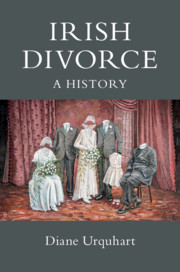Book contents
- Irish Divorce
- Irish Divorce
- Copyright page
- Dedication
- Contents
- Figures
- Acknowledgements
- Introduction: The ‘Anatomy of a Divorce’
- 1 Divorce in Two Legislatures: Irish Divorce, 1701–1857
- 2 The Failings of the Law: The Cases of Talbot and Westmeath
- 3 A Non-Inclusive Reform: Ireland and the Divorce and Matrimonial Causes Act of 1857
- 4 Divorce in the Post-Reform Era of 1857–1922: ‘Like Diamonds, Gambling, and Picture-Fancying, a Luxury of the Rich’
- 5 The Widening Definition of Marital Cruelty
- 6 Divorce in Court, 1857–1922
- 7 ‘An Exotic in Very Ungenial Soil’: Divorce in the Northern Ireland Parliament, 1921–1939
- 8 With as ‘Little Provocation as Possible’: The Northern Ireland Move to Court
- 9 An ‘Unhappy Affair’: Divorce in Independent Ireland, 1922–1950
- 10 Marriage Law ‘in This Country Is an Absolute Shambles’: The Reform Agenda
- 11 A ‘Curiosity [and] … an Oddity’: Referenda in 1986 and 1995
- 12 The ‘Last Stretch of a Long Road’: The Family (Divorce) Law Act of 1996
- Conclusion
- Bibliography
- Index
4 - Divorce in the Post-Reform Era of 1857–1922: ‘Like Diamonds, Gambling, and Picture-Fancying, a Luxury of the Rich’
Published online by Cambridge University Press: 16 January 2020
- Irish Divorce
- Irish Divorce
- Copyright page
- Dedication
- Contents
- Figures
- Acknowledgements
- Introduction: The ‘Anatomy of a Divorce’
- 1 Divorce in Two Legislatures: Irish Divorce, 1701–1857
- 2 The Failings of the Law: The Cases of Talbot and Westmeath
- 3 A Non-Inclusive Reform: Ireland and the Divorce and Matrimonial Causes Act of 1857
- 4 Divorce in the Post-Reform Era of 1857–1922: ‘Like Diamonds, Gambling, and Picture-Fancying, a Luxury of the Rich’
- 5 The Widening Definition of Marital Cruelty
- 6 Divorce in Court, 1857–1922
- 7 ‘An Exotic in Very Ungenial Soil’: Divorce in the Northern Ireland Parliament, 1921–1939
- 8 With as ‘Little Provocation as Possible’: The Northern Ireland Move to Court
- 9 An ‘Unhappy Affair’: Divorce in Independent Ireland, 1922–1950
- 10 Marriage Law ‘in This Country Is an Absolute Shambles’: The Reform Agenda
- 11 A ‘Curiosity [and] … an Oddity’: Referenda in 1986 and 1995
- 12 The ‘Last Stretch of a Long Road’: The Family (Divorce) Law Act of 1996
- Conclusion
- Bibliography
- Index
Summary
Although the sexual double standard endured in the divorce court, parliamentary divorce remained lengthier, costlier and more socially and gender-biased. This chapter examines the profile of Irish parliamentary divorce petitioners and legal critics of the system. Successive attempts to reform Irish divorce provision failed. The personal trials that the lack of legislative uniformity in the UK caused was underscored by the Yelverton case which invoked Scottish, Irish and English law and partially inspired a royal commission to consider extending the jurisdiction of the divorce court in 1861. The commission recommended the unification of divorce provision throughout the UK, but this was never implemented. A further royal commission considered the laws of marriage from 1865 and recommended that divorce laws should be unified throughout the UK, but like the earlier calls for Irish divorce reform, this was never enacted: Ireland remained legislatively stranded. The O’Shea divorce in 1891, citing Irish nationalist leader Parnell as co-respondent, also drew the association between morality and divorce ever tighter and the full force of moral Catholicism was unleashed for the first time.
Keywords
- Type
- Chapter
- Information
- Irish DivorceA History, pp. 76 - 105Publisher: Cambridge University PressPrint publication year: 2020

